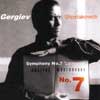Shostakovich Symphony No 7
A fine demonstration of Gergiev’s desire to find more music in Shostakovich’s music
View record and artist detailsRecord and Artist Details
Composer or Director: Dmitri Shostakovich
Genre:
Orchestral
Label: Philips
Magazine Review Date: 7/2003
Media Format: CD or Download
Media Runtime: 79
Mastering:
Stereo
DDD
Catalogue Number: 470 845-2PH

Tracks:
| Composition | Artist Credit |
|---|---|
| Symphony No. 7, 'Leningrad' |
Dmitri Shostakovich, Composer
Dmitri Shostakovich, Composer Kirov Orchestra Rotterdam Philharmonic Orchestra Valery Gergiev, Conductor, Bass |
Author: David Fanning
Valery Gergiev’s approach to Shostakovich’s most notorious symphony seems to be to let the drama take care of itself and to concentrate on the musical side of the equation. The result is an interpretation of satisfying wholeness, one that may not match the emotional rawness of a Mravinsky or a Kondrashin (neither of whose classic recordings is currently obtainable) but one that stands up well beside such highly regarded modern rivals as the occasionally mannered Bernstein, the generally more lightweight Ashkenazy and the less than brilliantly played Temirkanov. St Petersburg/ Leningrad was, it may be remembered, a city that prided itself on its civilised cultural values, and their preservation is arguably as much a part of the symphony’s message as is their brutalisation. In all this Gergiev is most persuasive.
Accordingly he lets the opening allegretto stride out confidently and contrasts it with a carefully moulded second theme. The ‘invasion’ march is as fast as the score marks – most performances are a notch slower – but the unsanctioned acceleration from around 16'20", just before the slowing into the requiem-like recapitulation, will not be to all tastes. This seems to be something of a St Petersburg tradition, in that Temirkanov makes very much the same intervention, and back in 1953 Mravinsky did so even more drastically. Ashkenazy persuades the same orchestra to stick to the score, and to my mind his accumulation is all the more terrifying for its implacable steadiness.
Under Gergiev each of the middle movements is humanely shaped, rather than being hewn from granite. Again this strategy is open to the charge of placing artistic means above dramatic ends. But in the long term it brings its rewards, and it leads naturally into the finale’s slow gathering of threads towards a noble, rather than earth-shattering peroration. Gergiev has been saying for a while that it is time ‘to find more music in Shostakovich’s music’, and this recording is a fine demonstration of what he means.
Quite how the combining of Gergiev’s two orchestras was arranged, I wouldn’t know; but it seems to have worked out well enough, without perhaps producing the extra heft or frisson one might have hoped for. There is much expressive distinction in the solo playing, though again not quite the depth of string tone of Bernstein’s Chicagoans and not quite the dominance from trumpets and trombones necessary to crown the biggest climaxes. The recording is well judged, though not as thrillingly spacious as it might have been.
Accordingly he lets the opening allegretto stride out confidently and contrasts it with a carefully moulded second theme. The ‘invasion’ march is as fast as the score marks – most performances are a notch slower – but the unsanctioned acceleration from around 16'20", just before the slowing into the requiem-like recapitulation, will not be to all tastes. This seems to be something of a St Petersburg tradition, in that Temirkanov makes very much the same intervention, and back in 1953 Mravinsky did so even more drastically. Ashkenazy persuades the same orchestra to stick to the score, and to my mind his accumulation is all the more terrifying for its implacable steadiness.
Under Gergiev each of the middle movements is humanely shaped, rather than being hewn from granite. Again this strategy is open to the charge of placing artistic means above dramatic ends. But in the long term it brings its rewards, and it leads naturally into the finale’s slow gathering of threads towards a noble, rather than earth-shattering peroration. Gergiev has been saying for a while that it is time ‘to find more music in Shostakovich’s music’, and this recording is a fine demonstration of what he means.
Quite how the combining of Gergiev’s two orchestras was arranged, I wouldn’t know; but it seems to have worked out well enough, without perhaps producing the extra heft or frisson one might have hoped for. There is much expressive distinction in the solo playing, though again not quite the depth of string tone of Bernstein’s Chicagoans and not quite the dominance from trumpets and trombones necessary to crown the biggest climaxes. The recording is well judged, though not as thrillingly spacious as it might have been.
Discover the world's largest classical music catalogue with Presto Music.

Gramophone Digital Club
- Digital Edition
- Digital Archive
- Reviews Database
- Full website access
From £8.75 / month
Subscribe
Gramophone Full Club
- Print Edition
- Digital Edition
- Digital Archive
- Reviews Database
- Full website access
From £11.00 / month
Subscribe
If you are a library, university or other organisation that would be interested in an institutional subscription to Gramophone please click here for further information.




